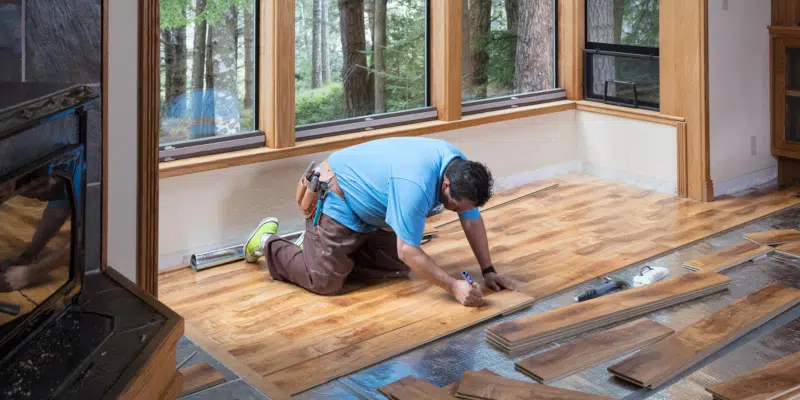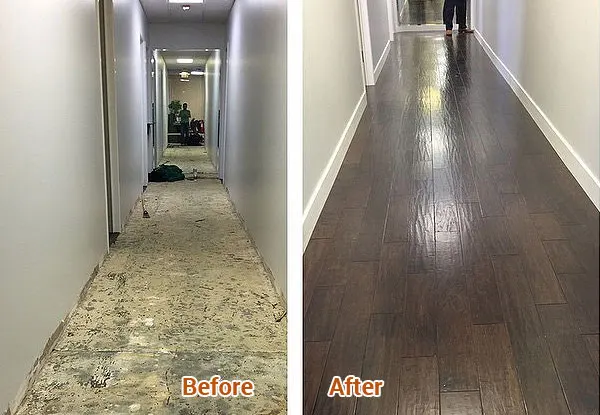The Complete Guide to Hardwood Floor Installation Costs in 2025
When planning a home renovation, understanding hardwood floor installation costs is crucial for making informed decisions about your flooring investment. The cost to install hardwood flooring varies significantly based on numerous factors, from the type of wood you choose to the complexity of your project. In 2025, homeowners can expect to pay between $6 and $25 per square foot for professional hardwood floor installation, making it essential to understand what influences these pricing variations.
The hardwood floor installation costs encompasses both materials and labor, with each component playing a significant role in your total investment. Whether you’re renovating a single room or transforming your entire home, having accurate cost estimates helps you budget effectively and avoid unexpected expenses during your flooring project.

Current Hardwood Floor Installation Costs Breakdown
Average Cost Per Square Foot
The hardwood floor installation cost in 2025 ranges from $6 to $12 per square foot for basic installations, with premium projects reaching $13 to $25 per square foot. For luxury installations with exotic woods or complex patterns, costs can extend up to $45 per square foot.
Here’s a detailed breakdown of current pricing:
Budget-Friendly Options: $6-$10 per square foot
- Domestic hardwoods like oak, maple, or hickory
- Standard 3-inch plank widths
- Pre-finished flooring
- Basic installation patterns
Mid-Range Installations: $10-$18 per square foot
- Premium domestic woods or imported species
- Wider planks (5-7 inches)
- Site-finished options
- Moderate complexity layouts
Premium Installations: $18-$25+ per square foot
- Exotic wood species
- Wide plank or custom cuts
- Intricate patterns or borders
- Specialized installation techniques
Material vs. Labor Cost Distribution
Hardwood flooring materials typically cost $6 to $15 per square foot, while installation labor adds another $3 to $10 per square foot. Labor expenses can account for 50% to 70% of the total hardwood floor installation costs, making it a significant portion of your budget.
Material Costs Include:
- Hardwood planks or boards
- Underlayment and moisture barriers
- Transition strips and moldings
- Adhesives, nails, or staples
- Finishing materials (for unfinished wood)
Labor Costs Cover:
- Subfloor preparation
- Professional installation
- Sanding and finishing (if applicable)
- Cleanup and disposal
- Final inspection and touch-ups
Factors That Influence Hardwood Floor Installation Costs
Wood Species and Grade Selection
The type of wood you choose dramatically impacts your hardwood floor installation costs. Domestic species like oak, maple, and cherry offer excellent value, while exotic woods like Brazilian cherry, teak, or mahogany command premium prices.
Popular Wood Species and Their Cost Impact:
- Oak: Most cost-effective option, excellent durability
- Maple: Slightly higher cost, beautiful light grain
- Cherry: Mid-range pricing, rich color that darkens over time
- Walnut: Premium domestic option with striking grain
- Brazilian Cherry: Exotic option with superior hardness
- Teak: Luxury choice with natural moisture resistance
Plank Width and Thickness
Wider planks create a more luxurious appearance but increase hardwood floor installation costs due to material waste and installation complexity. Standard 3-inch planks are most economical, while 5-7 inch wide planks can add 20-30% to your total cost.
Thickness also affects pricing:
- 3/4 inch: Standard thickness, moderate cost
- 5/8 inch: Engineered option, lower material cost
- 1/2 inch: Budget-friendly engineered, limited refinishing options
Installation Method and Complexity
The installation method significantly impacts your hardwood floor installation costs:
Nail-Down Installation: Most common and cost-effective for solid hardwood on wooden subfloors.
Glue-Down Installation: Required for concrete subfloors, adds adhesive costs and labor time.
Floating Installation: Typically used for engineered hardwood, faster installation but limited to specific products.
Room Size and Layout Considerations
Medium projects around 1,000 square feet typically cost $6,000-$25,000 total, while large installations of 2,000+ square feet range from $12,000-$50,000, offering better labor efficiency and bulk discounts.
Smaller rooms often have higher per-square-foot costs due to:
- Setup and mobilization charges
- Increased material waste
- More complex cutting requirements
- Higher labor inefficiency

Additional Costs to Consider in Your Hardwood Floor Installation Budget
Subfloor Preparation and Repairs
Additional costs include subfloor preparation and removal of existing flooring, which can significantly impact your hardwood floor installation costs. Subfloor issues might require:
- Leveling compounds: $2-$5 per square foot
- Moisture barrier installation: $0.50-$2 per square foot
- Structural repairs: $5-$15 per square foot
- Existing flooring removal: $1-$4 per square foot
Finishing and Refinishing Services
If you need to have your floors finished, expect to pay an additional $1 to $3 per square foot compared to pre-finished floors. Labor costs may also cover finishing services such as sanding, staining, and sealing the hardwood floors.
Finishing services include:
- Sanding: $1-$2 per square foot
- Staining: $1-$3 per square foot
- Polyurethane application: $1-$2 per square foot
- Multiple coat applications
Transitions and Trim Work
Professional installation includes transition pieces and trim work that affects your total cost:
- Threshold transitions: $3-$8 per linear foot
- Quarter round molding: $2-$5 per linear foot
- Baseboards: $3-$12 per linear foot
- Stair nosing: $10-$25 per linear foot
Additional Costs to Consider in Your Hardwood Floor Installation Budget
Geographic location significantly influences pricing due to local labor rates, material availability, and market competition. Urban markets typically see higher costs, while rural areas might have limited contractor availability.
High-Cost Regions (Major metropolitan areas):
- Labor rates: $6-$10 per square foot
- Total installation: $15-$30+ per square foot
- Premium material availability
Moderate-Cost Regions (Suburban and mid-size cities):
- Labor rates: $4-$7 per square foot
- Total installation: $10-$20 per square foot
- Good contractor selection
Lower-Cost Regions (Rural and smaller markets):
- Labor rates: $3-$5 per square foot
- Total installation: $8-$15 per square foot
- Limited specialty options
Pre-finished vs. Unfinished Hardwood Installation Costs
Pre-finished Hardwood Advantages
Pre-finished hardwood flooring costs $12-20 per square foot including material and installation, offering several benefits:
- Faster installation timeline
- Immediate use after installation
- Factory-quality finish
- No dust or fumes during installation
- Warranty coverage on finish
Unfinished Hardwood Considerations
Unfinished hardwood flooring costs $19-25 per square foot including material, installation, and finishing. While more expensive, unfinished floors offer:
- Custom stain colors
- Seamless appearance between boards
- Ability to match existing floors
- Higher-quality job-site finishes
- Better long-term refinishing options
Money-Saving Tips for Hardwood Floor Installation
Timing Your Installation Project
Schedule your hardwood floor installation during contractors’ slower seasons (typically late fall and winter) to potentially negotiate better rates. Many flooring professionals offer discounts during these periods to maintain steady work.
Bulk Purchasing and Multiple Room Discounts
Installing hardwood floors in multiple rooms simultaneously reduces your per-square-foot hardwood floor installation costs through:
- Bulk material discounts
- Reduced setup and mobilization fees
- Improved labor efficiency
- Coordinated project timeline
DIY Preparation Work
Reduce labor costs by handling preparation tasks yourself:
- Remove existing furniture and fixtures
- Clear the workspace completely
- Remove old flooring (if capable)
- Basic cleaning and preparation
However, leave technical aspects like subfloor evaluation and correction to professionals to avoid costly mistakes.
Material Selection Strategy
Choose cost-effective materials that still meet your aesthetic goals:
- Select domestic wood species over exotic options
- Consider engineered hardwood for certain applications
- Choose standard plank widths and lengths
- Opt for pre-finished floors in most situations
Professional Installation vs. DIY Considerations
Benefits of Professional Installation
Professional installation ensures your hardwood floor investment is protected through:
- Expert subfloor evaluation and preparation
- Proper moisture management techniques
- Precision cutting and fitting
- Appropriate fastening methods
- Professional finishing (if applicable)
- Warranty coverage on workmanship
DIY Installation Challenges
While DIY installation can reduce your hardwood floor installation costs, consider these challenges:
- Specialized tool requirements
- Technical knowledge needed
- Time investment (typically 3-5 times longer)
- Risk of costly mistakes
- No warranty on installation
- Potential for decreased home value
Most professionals recommend DIY only for experienced woodworkers with proper tools and ample time.
Getting Accurate Hardwood Floor Installation Cost Estimates
What to Expect During Estimates
Professional contractors should provide detailed estimates that include:
- Material costs broken down by type and quantity
- Labor costs with clear scope of work
- Additional service costs (preparation, finishing, etc.)
- Timeline for project completion
- Warranty information
- Payment schedule
Questions to Ask Contractors
Ensure accurate hardwood floor installation costs estimates by asking:
- What specific services are included?
- Are there potential additional costs?
- What is your payment schedule?
- How do you handle unexpected issues?
- What warranties do you provide?
- Can you provide recent customer references?
Comparing Multiple Estimates
Obtain at least three detailed estimates to understand market rates in your area. Remember that the lowest bid isn’t always the best value – consider:
- Contractor experience and reputation
- Quality of materials specified
- Completeness of services included
- Timeline and availability
- Insurance and licensing status
Maximizing Your Hardwood Floor Investment
Long-term Value Considerations
While hardwood floor installation costs represents a significant upfront investment, quality hardwood floors offer excellent long-term value through:
- Increased home resale value (typically 70-80% return on investment)
- Durability lasting 25-100+ years with proper care
- Multiple refinishing opportunities
- Timeless aesthetic appeal
- Low maintenance requirements compared to other flooring
Maintenance Cost Planning
Factor ongoing maintenance into your total cost of ownership:
- Annual cleaning supplies: $50-$100
- Professional cleaning (optional): $200-$500 annually
- Refinishing every 10-15 years: $3-$8 per square foot
- Minor repairs and touch-ups: $100-$300 annually
Energy Efficiency Benefits
Hardwood floors can contribute to energy efficiency through:
- Better temperature regulation than carpet
- Compatibility with radiant heating systems
- Reduced allergen accumulation
- Improved indoor air quality
Planning Your Hardwood Floor Installation Project
Project Timeline Expectations
Typical hardwood floor installation timelines vary based on project scope:
Single Room (200-300 sq ft): 2-3 days
- Day 1: Preparation and subfloor work
- Day 2: Installation
- Day 3: Finishing touches and cleanup
Multiple Rooms (800-1,200 sq ft): 4-7 days
- Days 1-2: Preparation and initial installation
- Days 3-5: Continued installation
- Days 6-7: Finishing and final details
Whole House (2,000+ sq ft): 1-2 weeks
- Extended timeline allows for proper acclimation
- Staged completion by area
- Comprehensive quality control
Seasonal Considerations
Schedule your hardwood floor installation considering:
- Spring: High demand, book early
- Summer: Peak season, higher prices
- Fall: Good availability, moderate weather
- Winter: Lower demand, potential discounts
Wood acclimation is crucial regardless of season, requiring materials to adjust to your home’s humidity levels for 3-7 days before installation.
Conclusion: Making Your Hardwood Floor Installation Investment
Understanding hardwood floor installation costs helps you make informed decisions about one of your home’s most important improvements. While the initial investment ranges from $6 to $25+ per square foot depending on your choices, quality hardwood floors provide decades of beauty, durability, and increased home value.
The key to a successful hardwood flooring project lies in balancing your aesthetic preferences with your budget while choosing experienced professionals who can deliver quality installation. Remember that the lowest price doesn’t always provide the best value – focus on finding contractors who offer fair pricing for quality materials and expert craftsmanship.
By carefully considering all relevant factors – from wood species and installation methods to room size and regional variations – you can create a realistic budget that achieves your flooring goals while maximizing your investment return.
Have any questions? Contact us today to speak with our team about your needs. Based on your flooring type and size, we’ll be able to recommend options within your budget and on your schedule. Call anytime or reach us via email.






